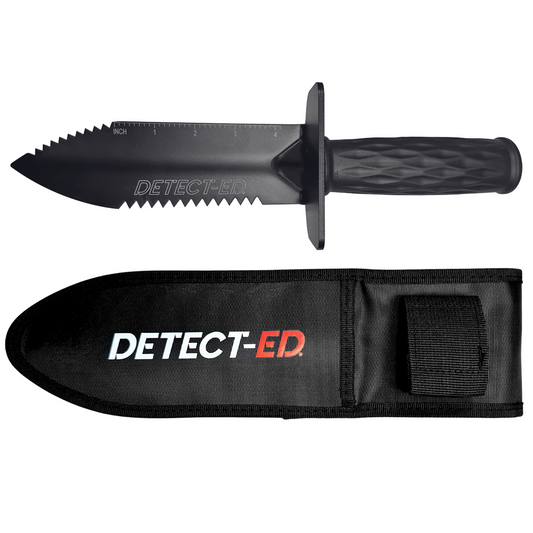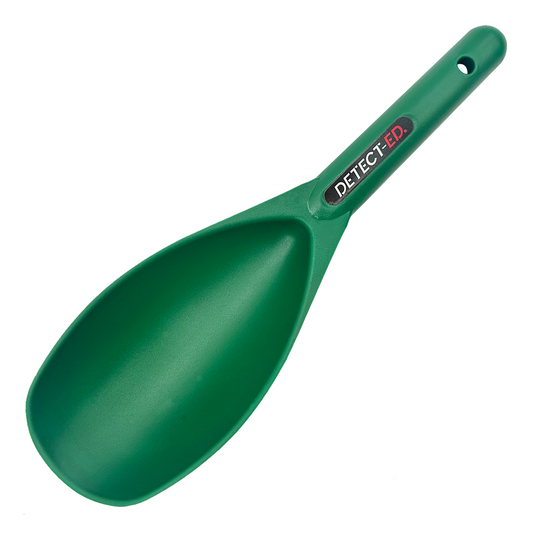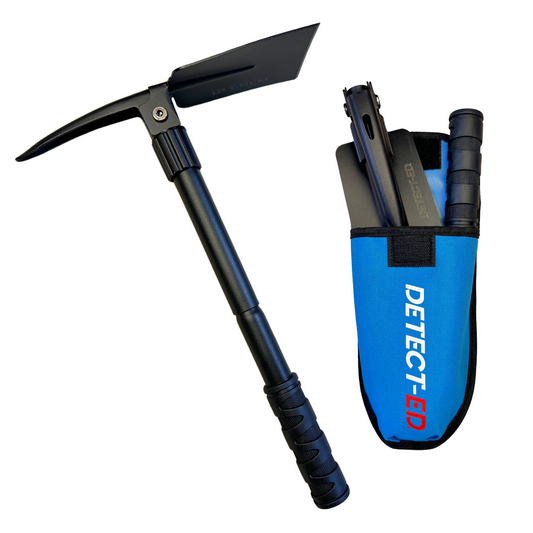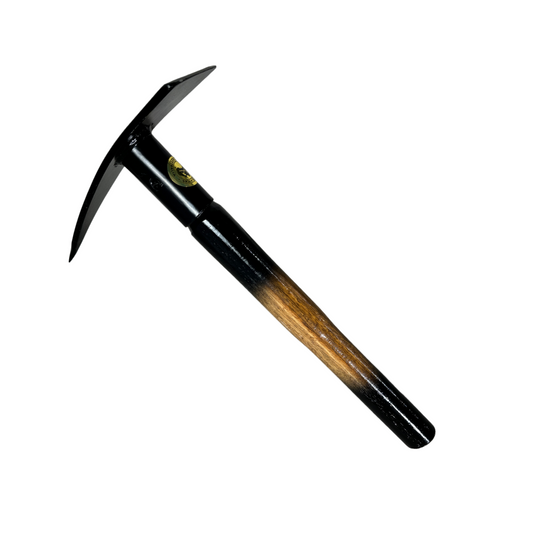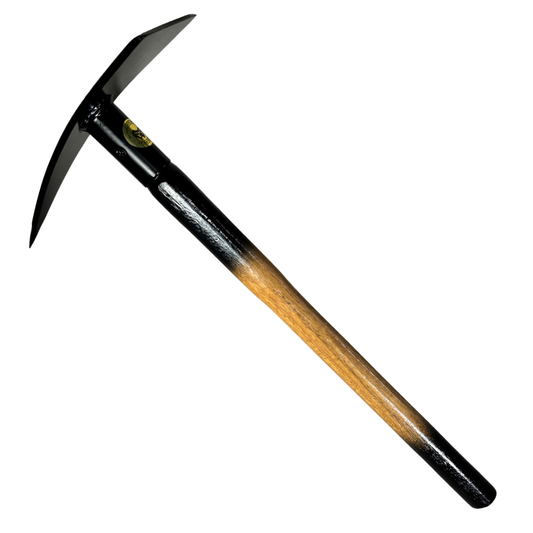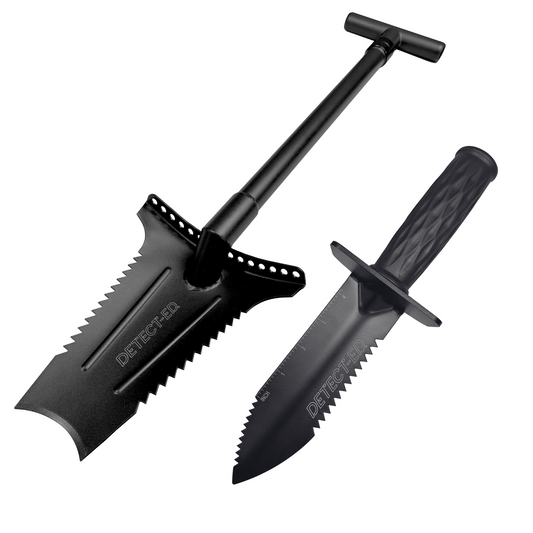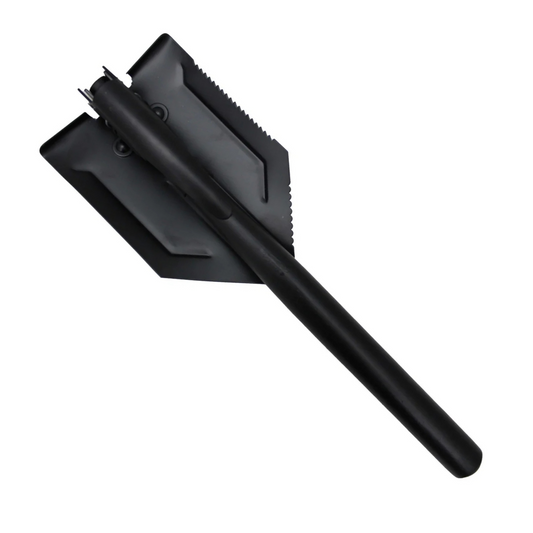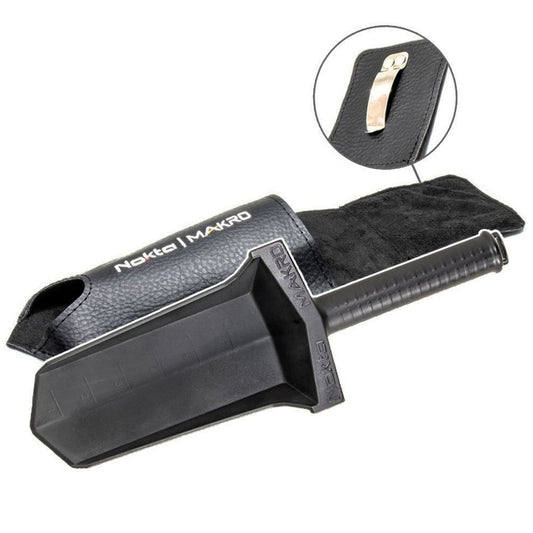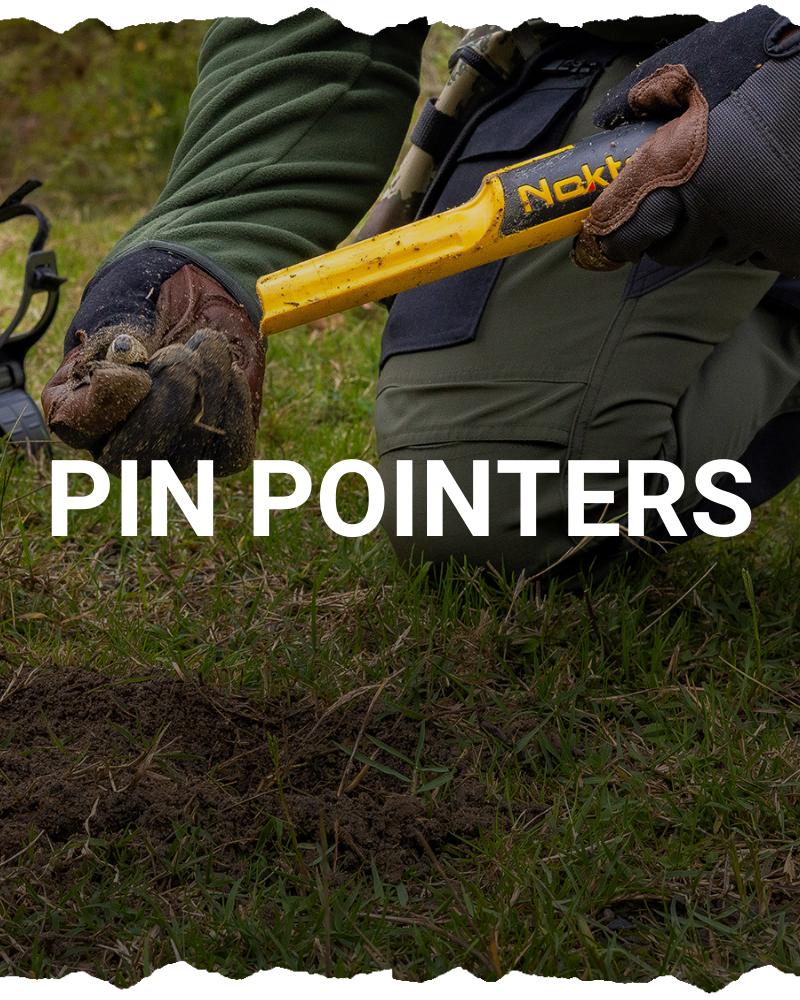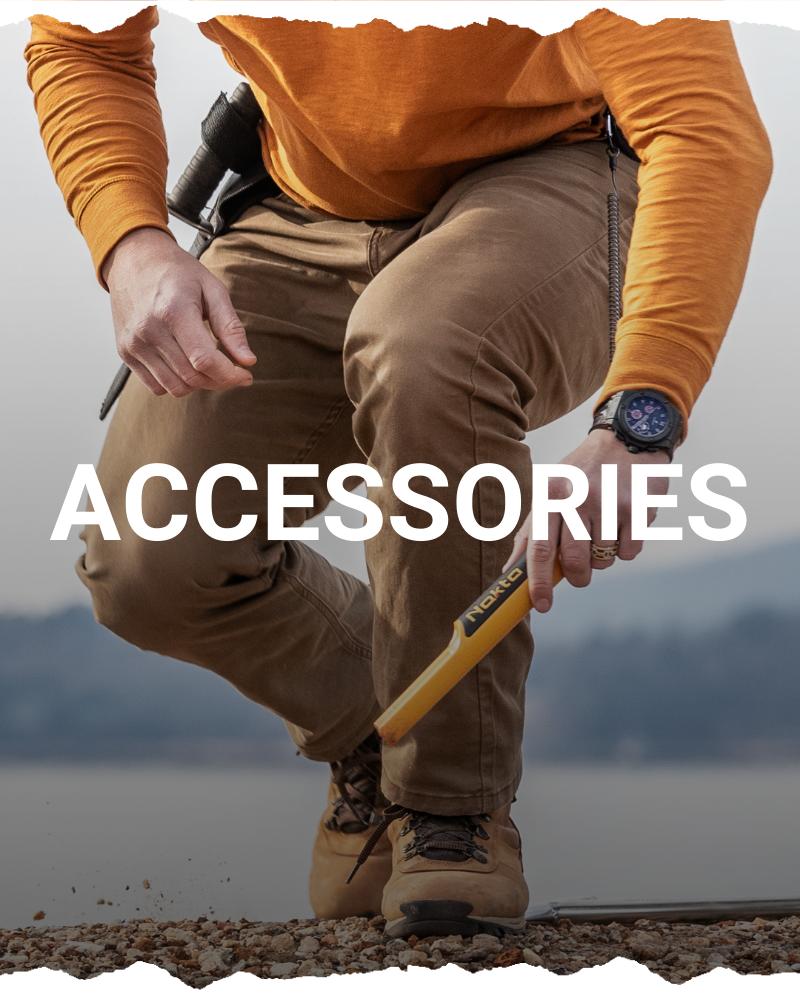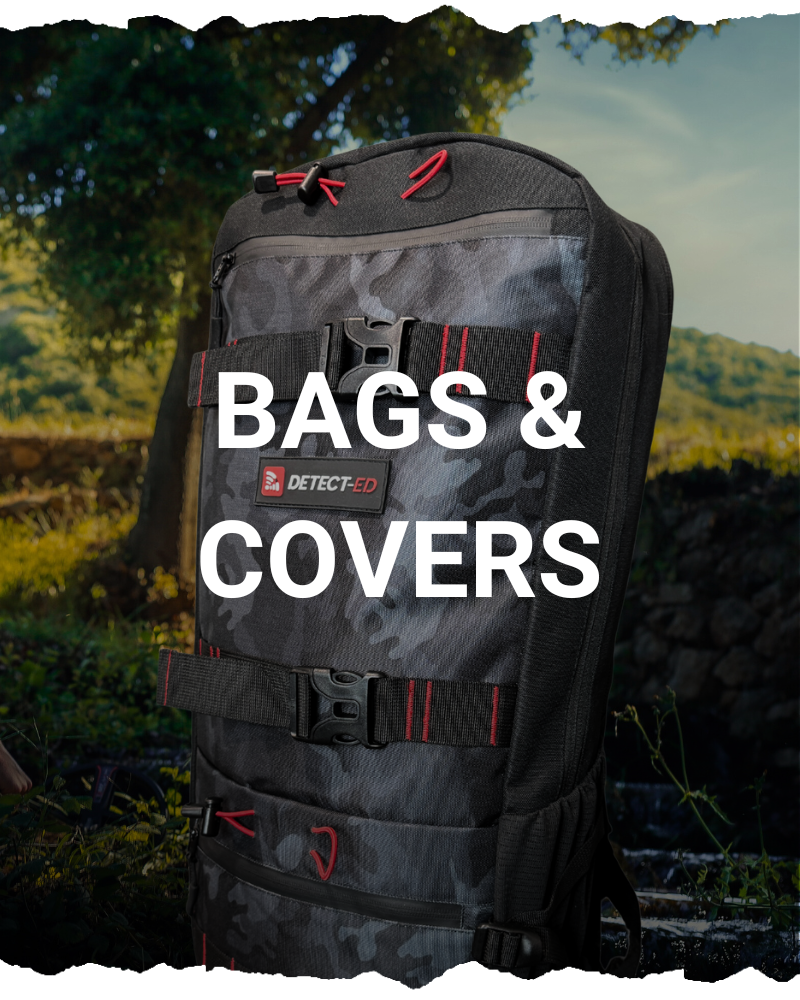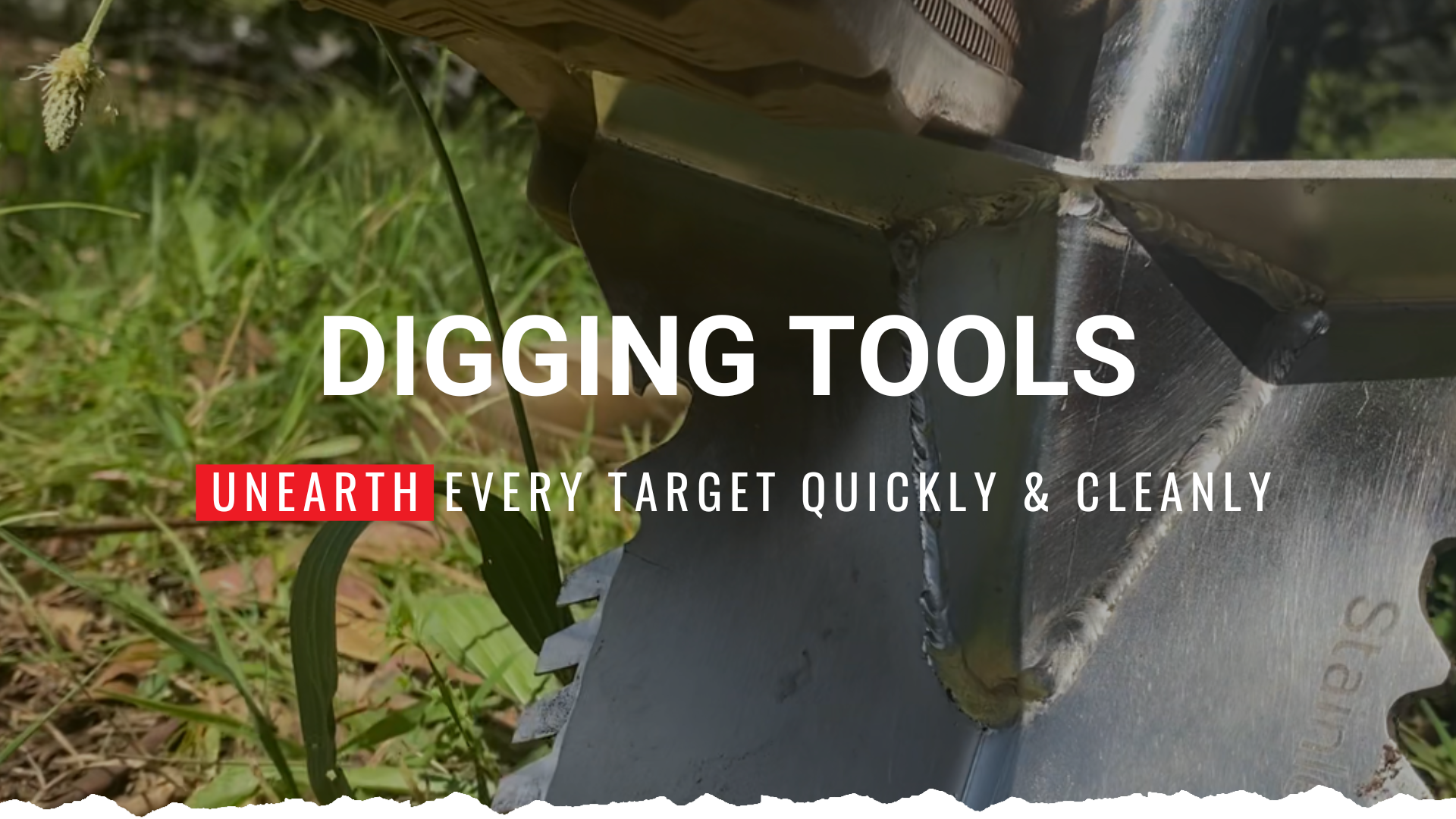
METAL DETECTOR DIGGING TOOLS
Without a doubt, the most important tool we use when out metal detecting (other than the metal detector itself) would have to be the digging tool! Whether you are detecting at the beach, in a grassy field or in the gold fields, a purpose-built shovel or scoop can massively increase the number of finds made by increasing the speed you recover buried objects.
At Detect-Ed Metal Detecting Australia, we stock a wide range of highly specialised metal detecting shovels, scoops, sieves and diggers for treasure hunters all over with fast shipping and full warranty!
You can find our range of metal detecting digging tools below, learn everything you need to know in our FAQ at the bottom or contact our friendly team of expert detectorists to find the right tool for you.
-
POUCH & DIGGER SUPER DEAL
Vendor:Detect-EdRegular price $65.00 AUDRegular price$126.00 AUDSale price $65.00 AUDSale -
STEALTH SHOVEL SUPER DEAL
Vendor:Detect-EdRegular price $99.00 AUDRegular price$216.00 AUDSale price $99.00 AUDSale -
STEALTH PROSPECTING PICK
Vendor:Detect-EdRegular price $59.00 AUDRegular price$85.00 AUDSale price $59.00 AUDSale -
STEALTH DIGGER + BELT HOLSTER
Vendor:Detect-EdRegular price $38.00 AUDRegular price$59.00 AUDSale price $38.00 AUDSale -
 Sale
SaleSTEALTH SHOVEL
Vendor:Detect-EdRegular price $110.00 AUDRegular price$149.00 AUDSale price $110.00 AUDSale -
GREEN PROSPECTING SCOOP
Vendor:Detect-EdRegular price From $18.00 AUDRegular price$21.00 AUDSale price From $18.00 AUDSale -
PLASTIC BEACH SAND SCOOP SIFTER
Vendor:Detect-EdRegular price From $23.00 AUDRegular price -
BEACH SAND SCOOP V2 + CARBON HANDLE
Vendor:Detect-EdRegular price $269.00 AUDRegular price$300.00 AUDSale price $269.00 AUDSale -
STEALTH TRIPLE TOOL COMBO
Vendor:Detect-EdRegular price $175.00 AUDRegular price$293.00 AUDSale price $175.00 AUDSale -
Fold Up Prospecting Mini Pick
Vendor:Detect-EdRegular price $35.00 AUDRegular price$55.00 AUDSale price $35.00 AUDSale -
WALCO BISALLOY SMALL PICK
Vendor:WalcoRegular price $115.00 AUDRegular price -
WALCO BISALLOY MEDIUM PICK
Vendor:WalcoRegular price $140.00 AUDRegular price -
Premium Digger Knife
Vendor:NoktaRegular price $69.00 AUDRegular price -
LAND HUNTER RECOVERY BUNDLE
Vendor:Detect-EdRegular price $172.00 AUDRegular price$275.00 AUDSale price $172.00 AUDSale -
 Sale
SaleSTARTER BEACH BUNDLE
Vendor:Detect-EdRegular price $59.00 AUDRegular price$105.00 AUDSale price $59.00 AUDSale -
TREASURE POUCH & SHOVEL SUPER DEAL
Vendor:Detect-Ed AustraliaRegular price $99.00 AUDRegular price$216.00 AUDSale price $99.00 AUDSale -
 Sale
SalePRO BEACH BUNDLE
Vendor:Detect-EdRegular price $398.00 AUDRegular price$562.00 AUDSale price $398.00 AUDSale -
 Sale
SaleLAND EXPLORER BUNDLE
Vendor:Detect-EdRegular price $399.00 AUDRegular price$507.00 AUDSale price $399.00 AUDSale -
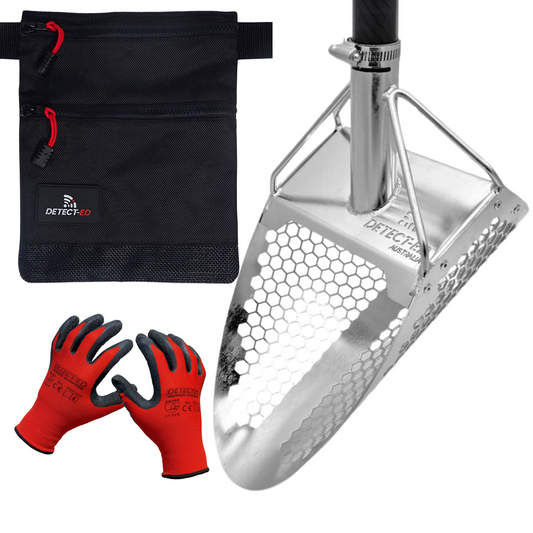 Sale
SaleBEACH HUNTER BUNDLE
Vendor:Detect-EdRegular price $299.00 AUDRegular price$367.00 AUDSale price $299.00 AUDSale -
STEALTH SHOVEL & DIGGER COMBO
Vendor:Detect-EdRegular price $128.00 AUDRegular price$208.00 AUDSale price $128.00 AUDSale -
NOKTA POINTER COMPLETE BUNDLE
Vendor:Detect-EdRegular price $225.00 AUDRegular price$325.00 AUDSale price $225.00 AUDSale -
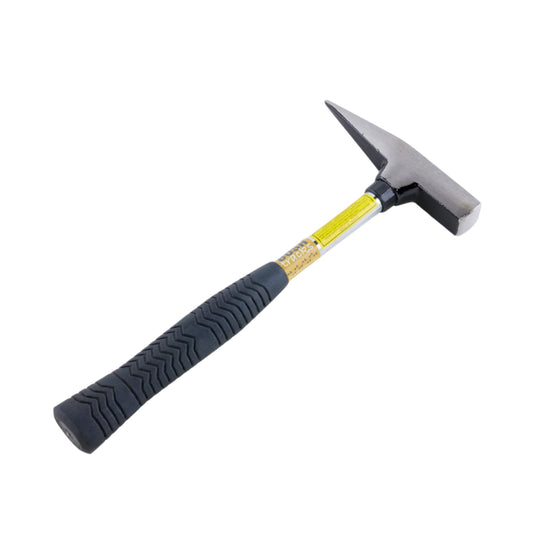 Sold out
Sold outGEOLOGIST ROCK PICK
Vendor:Bush TracksRegular price $25.00 AUDRegular price -
ENTRENCHING TOOL WITH PICK
Vendor:Bush TracksRegular price $17.00 AUDRegular price$35.00 AUDSale price $17.00 AUDSale -
Standard Digger
Vendor:NoktaRegular price $35.00 AUDRegular price
OTHERS ALSO EXPLORED:
-
What metal detecting shovel is best on land?
Dedicated metal detecting shovels and digging tools for treasure hunting on land provide a number of important and special advantages over the traditional and humble shovel or garden trowel, primarily that they save you massive amounts of time and energy plus they’re significantly easier to use.
There are actually two main kinds of metal detecting shovels for land, full-sized shovels and smaller compact hand-held digging knives. In a sensitive park environment, a full sized metal detecting shovel will probably not be appropriate or appreciated. So this is where your smaller hand digging tool comes in to cut smaller holes without a fuss. In other areas, such as the bush or a paddock, a full sized metal detecting shovel is ideal, allowing you to more easily cut and dig deeper and larger holes.
Generally, it’s a good idea to carry both of these crucial metal detecting tools with you in your detecting backpack or car if you can, so that you’re always prepared for any situation! -
What metal detecting sand scoop is best at the beach?
Metal detecting at the beach is very different from metal detecting on land in a few important ways. Firstly, it is much easier to dig in the sand than it is in the dirt, rocks and grass. Secondly, the sand at the beach or in the water is loose and can be sifted easily. Lastly, the consistency of dry or wet sand means that when you create a hole, the sand or water wants to rush in and collapse the hole.
What all this means for any beach-inclined treasure hunter is the need for a durable, corrosion resistant sand scoop with a wide enough mouth for scooping sand and enough holes that allow you to shake the scoop in the air or water to sift out all the sand. These holes need to be large enough that the sand in your scoop or sieve can fall out efficiently, but not so large that your freshly dug ring or coin falls out, or the strength of the scoop itself is compromised. -
What is the difference between a long handled beach scoop vs a hand held beach scoop?
Depending on your budget, the main differences between metal detecting sand scoops that you hold in your hand vs ones that have a long pole or handle is their ease of use, recovery speed and portability. If you’re on a tight budget and/or might only go to the beach very occasionally, a hand held beach sieve or scoop can be ideal. These scoops are also very compact, ideal for air travel.
If you’re looking to avoid bending down often and want to dig standing up, a long handled beach sand scoop will make it significantly easier and faster to dig up the buried object, compared to a hand held beach scoop. This is especially important if you’re fighting incoming surf or wet sand that is threatening to quickly re-bury your next epic treasure!
It's also worth noting that long handle beach scoops are ideal when you're wading in water past your ankles. -
Which kind of scoop or shovel do I need for gold prospecting?
Australian gold prospectors use a range of different scoops. shovels and picks depending on how and where they're prospecting for gold.
If you're using a metal detector to find gold nuggets in the Aussie goldfields, then a plastic hand held scoop is essential.Since most gold nuggets in the gold fields are often small and covered or surrounded by rocks, dirt and gravel, getting down on the ground and using a small hand held tool to wave over a metal detector is a life-saver compared to relying on eyesight alone!
This will allow you to carefully check dirt in the scoop for where the gold is inside the scoop, since a metal scoop would obviously just set off your metal detector! Many gold prospecting tools feature connection points that you can use to secure them to something as well, meaning you won't accidentally lose them in the field!




